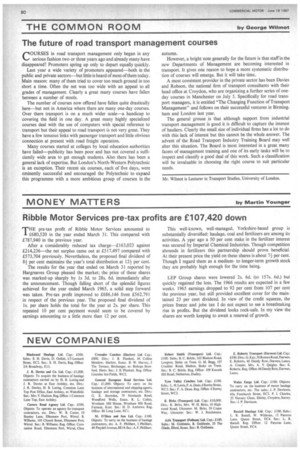THE COMMON ROOM by George Wilmot
Page 92

If you've noticed an error in this article please click here to report it so we can fix it.
The future of road transport management courses
COURSES in road transport management only began in any serious fashion two or three years ago and already many have disappeared! Promoters spring up only to depart equally quickly.
Last year a wide variety of promoters appeared—both in the public and private sectors—but little is heard of most of them today. Main reason: many of them tried to cover too much ground in too short a time. Often the net was too wide with an appeal to all grades of management. Clearly a great many courses have fallen between a number of stools.
The number of courses now offered have fallen quite drastically here—but not in America where there are many one-day courses. Over there transport is on a much wider scale—a handicap to covering the field in one day. A great many highly specialized courses deal with the use of computers with special reference to transport but their appeal to road transport is not very great. They have a few tenuous links with passenger transport and little obvious connection at present with road freight operation.
Many courses started at colleges by local education authorities have failed—publicity has been poor and has not covered a sufficiently wide area to get enough students. Also there has been a general lack of expertise. But London's North-Western Polytechnic is an exception. Their recent six courses, each of five days, were eminently successful and encouraged the Polytechnic to expand this programme with a more ambitious group of courses in the autumn.
However, a bright note generally for the future is that staff in the new Departments of Management are becoming interested in transport. It gives one reason to hope a more systematic distribution of courses will emerge. But it will take time.
A most consistent provider in the private sector has been Davies and Robson, the national firm of transport consultants with their head office at Croydon, who are organizing a further series of oneday courses in Manchester on July 5. Specifically for road transport managers, it is entitled "The Changing Function of Transport Management" and follows on their successful ventures in Birmingham and London last year.
The general grouse is that although support from industrial transport management is good it is difficult to capture the interest of hauliers. Clearly the small size of individual firms has a lot to do with this lack of interest but this cannot be the whole answer. The advent of the Road Transport Industry Training Board may well alter this situation. The Board is most interested in a great many facets of management training and one of its early tasks will be to inspect and classify a good deal of this work. Such a classification will be invaluable in choosing the right course to suit particular needs.
Mr. Wilmot is Lecturer in Transport Studies, University of London.




































































































































